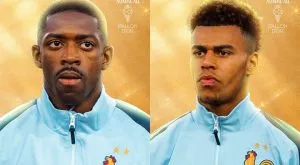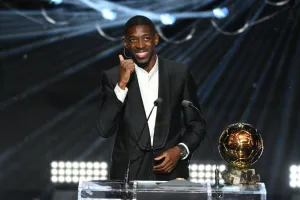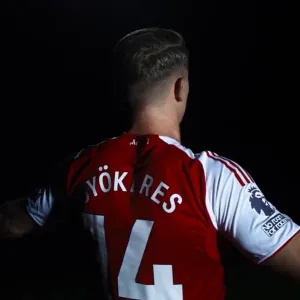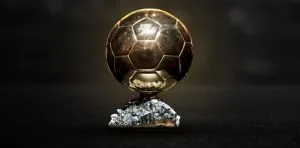Ousmane Dembélé Claims the 2025 Ballon d’Or Crown!
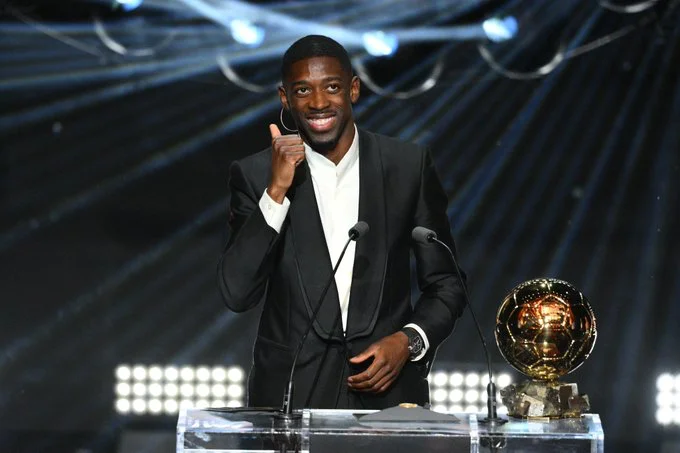
On September 22, 2025, at the opulent Théâtre du Châtelet in Paris, Ousmane Dembélé etched his name into football immortality by clinching the coveted Ballon d’Or, the pinnacle of individual achievement in the sport. The 28-year-old Paris Saint-Germain forward, born in Vernon, France, to a Malian father and Mauritanian mother, stood tall amid a glittering ceremony, accepting the golden orb that symbolizes global supremacy. This victory wasn’t just a personal milestone; it marked a seismic shift for PSG, who, in the wake of Kylian Mbappé’s departure to Real Madrid, transformed from perennial underdogs in Europe to continental conquerors. Dembélé’s win edges out Barcelona’s teenage sensation Lamine Yamal, who finished as runner-up, in a duel that encapsulated the blend of experience and youthful flair defining modern football.
A Rocky Road to Stardom: Dembélé’s Career Trajectory
Dembélé’s journey to this zenith has been anything but linear—a narrative of raw talent tempered by adversity. Bursting onto the scene at Rennes in 2014 as a 17-year-old prodigy, his blistering pace, silky dribbling, and eye for the spectacular drew comparisons to a young Thierry Henry. A €15 million move to Borussia Dortmund in 2016 accelerated his rise: in just 50 appearances, he notched 10 goals and 21 assists, including a memorable long-range strike in the 2017 DFB-Pokal final. That form lured Barcelona, who shattered their transfer record for an 18-year-old with a €105 million swoop in 2017, intended as a direct heir to Neymar’s flair post-PSG heist.
Yet, Barcelona years were a crucible of frustration. Chronic hamstring injuries sidelined him for over 500 days across his tenure, fueling perceptions of him as a “luxury sub” rather than a linchpin. In 185 La Liga outings, he managed 40 goals and 41 assists—impressive but underwhelming for the fee and hype. Off-field, his affinity for video games and occasional tardiness to training sessions painted him as immature. By 2023, with Barcelona’s financial woes mounting, a €50 million transfer to PSG under Luis Enrique offered a fresh canvas. It was here, in the City of Light, that Dembélé shed the “what if” label, evolving into a metronomic creator and finisher who redefined his legacy.
Internationally, Dembélé’s arc mirrors his club struggles. Debuting for France in 2016, he tallied 9 goals in 45 caps by 2025, including key contributions to their 2022 World Cup final run. Injuries hampered his Euro 2024 campaign, but his 2025 resurgence made him indispensable to Didier Deschamps’ Les Bleus, who defended their Nations League title with him as a creative fulcrum.
The Breakout 2024-2025 Season: Stats That Shattered Doubts
Dembélé’s Ballon d’Or case rested on an unparalleled 2024-2025 campaign, where he shouldered PSG’s attack post-Mbappé and delivered metrics befitting a world-beater. Across 52 appearances in all competitions, he amassed 35 goals and 16 assists—a career zenith that blended volume with versatility. Breaking it down:
- Ligue 1 (34 matches, 20 starts): 29 goals and 21 assists. Dembélé terrorized defenses with his signature bursts, leading the league in dribbles completed (142) and key passes (89). His hat-trick against Lyon in March 2025 single-handedly ignited PSG’s title charge, ending Monaco’s brief challenge.
- Coupe de France (6 matches, 3 starts): 4 goals and 3 assists, including a brace in the final against Lille that sealed a 3-1 victory and PSG’s domestic double.
- UEFA Champions League (12 matches, 10 starts): The crown jewel—8 goals and 5 assists en route to PSG’s maiden European crown. His virtuoso display in the semi-final second leg against Bayern Munich (two goals, one assist in a 4-2 thriller) and a composed penalty in the final shootout against Manchester City (after a 1-1 draw) earned him Champions League Player of the Season honors. Dembélé’s 15 big chances created in the tournament underscored his role as PSG’s “maestro of mayhem.”
Defensively, he contributed 28 tackles and 42 interceptions, evolving into a pressing monster under Enrique’s high-octane system. Advanced metrics paint an even rosier picture: an xG overperformance of +12.4, 3.2 successful take-ons per 90 minutes (top percentile among wingers), and a 92% pass accuracy in the final third. At 28, his physical peak—honed by rigorous injury-prevention protocols—allowed him to play 4,200 minutes without a major setback, a far cry from his Barcelona fragility.
PSG’s treble (Ligue 1, Coupe de France, Champions League) was the ultimate endorsement. Enrique’s tactical pivot to a fluid 4-3-3, with Dembélé as inverted winger feeding strikers like Gonçalo Ramos, yielded 112 league goals—the most in Europe’s top five. Without Dembélé’s output, PSG might have faltered; with it, they dominated, amassing 92 points in Ligue 1 and conceding just 22 goals.
Why Dembélé Over the Field? A Case of Impact and Narrative
The Ballon d’Or, voted by global journalists, prioritizes collective glory fused with individual brilliance. Dembélé’s edge over Yamal—who dazzled with 18 goals and 21 assists in Barcelona’s La Liga and Copa del Rey double—was his decisive hand in silverware. Yamal, at 17, was a phenomenon, but Barcelona’s Champions League quarter-final exit to Arsenal diluted his case. Other contenders like Real Madrid’s Jude Bellingham (midfield maestro in their La Liga title) and Arsenal’s Viktor Gyökeres (32 Premier League goals) shone, but lacked the treble sheen.
Critics might argue Dembélé benefited from Ligue 1’s perceived weakness or PSG’s oil-funded squad. Yet, his Champions League heroics—scoring in five knockout ties—silence that. Voters lauded his “redemption arc”: from injury-plagued prodigy to PSG’s talisman, proving resilience trumps potential. As Enrique noted post-win, “Ousmane didn’t just score; he carried us when the world watched.” France’s Nations League success, with Dembélé’s three assists in the finals, added international gloss, edging him past non-European winners.
Ceremony Highlights and Broader Awards
The Paris gala, broadcast live to millions, buzzed with anticipation. Dembélé, nursing a minor thigh niggle from PSG’s weekend derby prep against Marseille, arrived in a bespoke Tom Ford tuxedo, flanked by family and Enrique. Host Didier Drogba quipped, “From Dortmund’s Yellow Wall to Paris’ golden throne—Ousmane, you’ve dribbled past doubt.” His acceptance speech, delivered in flawless French and English, thanked his parents, Enrique (“my second father”), and Mbappé (“a brother who lit the path”). He dedicated the award to “every kid from the banlieues dreaming big,” pledging €1 million to youth academies in Vernon.
The night brimmed with accolades:
- Men’s Yashin Trophy (Best Goalkeeper): Gianluigi Donnarumma (Manchester City/Italy), for his 18 clean sheets in City’s Premier League triumph.
- Women’s Yashin Trophy: Hannah Hampton (Chelsea/England), anchoring the Lionesses’ Women’s Super League defense.
- Men’s Gerd Müller Trophy (Top Scorer): Viktor Gyökeres (Arsenal/Sweden), with 42 goals across competitions.
- Women’s Gerd Müller Trophy: Ewa Pajor (Barcelona/Poland), 34 goals in a treble-winning season.
- Kopa Trophy (Best Young Player, Men): Lamine Yamal (Barcelona/Spain).
- Kopa Trophy (Women): Vicky López (Barcelona/Spain).
- Johan Cruyff Trophy (Best Coach, Men): Luis Enrique (PSG).
- Johan Cruyff Trophy (Women): Sarina Wiegman (England).
The women’s Ballon d’Or went to Alexia Putellas (Barcelona/Spain), capping a dominant year.
Global Reactions: Ecstasy, Envy, and Echoes
The announcement ignited a digital firestorm. In France, #DembéléDor trended nationwide, with President Macron tweeting, “Ousmane embodies our joie de vivre on the pitch—bravo!” PSG’s Parc des Princes erupted in chants during their paused Marseille match, fans unfurling a tifo of Dembélé in golden boots. Teammates like Achraf Hakimi called it “justice for a warrior,” while Mbappé posted a heartfelt Instagram video: “Mon frère, you were always the magician. This is yours.”
Abroad, reactions mixed awe and saltiness. Barcelona faithful lamented Yamal’s near-miss, with some X users dubbing it “theft,” but most conceded Dembélé’s merit. English media hailed it as “the end of the Messi-Ronaldo duopoly,” with The Guardian’s Jonathan Wilson praising his “evolved chaos.” In Africa, where Dembélé reps Mali heritage, Bamako streets partied late, viewing him as a pan-African icon.
Skeptics, particularly in England and Spain, pointed to Ligue 1 bias, but data debunks it: Dembélé’s UCL metrics outpaced Premier League stars like Mohamed Salah (who finished third). On X, viral memes juxtaposed his Barcelona flops with PSG glory, captioned “From flop to top.” Peers like Bellingham messaged congrats, while Yamal’s gracious post—“Learning from the best”—earned universal respect.
Legacy and What’s Next for Dembélé and PSG
This Ballon d’Or cements Dembélé as France’s preeminent talent post-Mbappé era, potentially fast-tracking a 2026 World Cup captaincy. For PSG, it’s validation of their Qatari-backed vision: €1.2 billion invested since 2011 yielding Europe’s summit. Enrique, now a coaching legend, eyes a contract extension, with Dembélé as the unbreakable core alongside emerging stars like Warren Zaïre-Emery.
Looking ahead, Dembélé’s market value soars to €120 million, but loyalty to PSG—where he signed until 2028—seems ironclad. Whispers of a Real Madrid pursuit post-Mbappé reunion linger, but his focus is clear: defending titles and inspiring the next generation. As he quipped post-ceremony, “The ball’s at my feet—watch me dance.”
In an era craving authenticity, Dembélé’s win reminds us: true greatness isn’t flawless—it’s forged in fire, delivered with flair. Football’s new king has arrived, and the throne fits perfectly.
